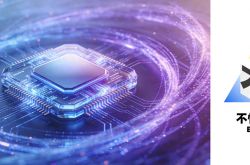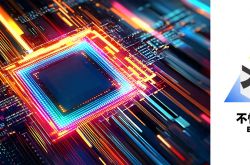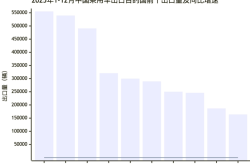Industrial Metaverse Renaissance: How Generative AI Accelerates the Productivity Revolution in Virtual-Real Convergence?
![]() 08/06 2025
08/06 2025
![]() 646
646
Original by IoT Intelligence
This marks my 382nd column article.
Recently, I've noticed a resurgence in discussions about the once-buzzy term 'Metaverse.' It was just two years ago when the Metaverse captivated the globe, with numerous enterprises, investors, and media outlets heralding it as the next big thing in the digital realm.
However, the fervor soon subsided, giving way to doubts, skepticism, and even theories of its demise. Is this really the end for the Metaverse?
Emerging evidence suggests that far from vanishing, the Metaverse is quietly integrating deeply with industrial technologies like AIoT and agents, fostering novel forms and industrial value after navigating bubbles and troughs.
As stories of virtual land speculation and NFT wealth flaunting fade into the background, underlying technologies such as spatial computing, digital twins, and AIoT have opened a genuine window for value innovation. They are no longer mere concepts but are reshaping industrial processes across sectors like manufacturing, healthcare, urban development, and education, becoming the cornerstone for productivity leaps.
If the initial Metaverse wave was a conceptual spectacle, today's Metaverse is evolving into a diverse landscape where the Industrial Metaverse, Enterprise Metaverse, and Consumer Metaverse coexist.
Among them, the Industrial Metaverse stands out as the most promising growth pole with significant commercial value in the next 5-10 years. It embodies high barriers to entry, substantial value, deep integration, and robust competitiveness, making it the primary battleground for global technology and real-world economies.
Thus, the Industrial Metaverse is not a virtual utopia but a crucible for genuine productivity evolution. Post the initial hype, we are now witnessing a genuine infrastructure construction phase: Enterprises are leveraging AIoT as a bridge, digital twins as a lens, and spatial computing and generative AI as engines to build a new industrial ecosystem characterized by virtual-real coexistence, data-driven insights, and emergent intelligence.
We can foresee that the next breakthrough will undoubtedly emerge from those industrial scenarios with the most transformative potential—not as a bubble of hype but as industry implementation.
Generative AI is propelling the Metaverse from a conceptual showcase to the main stage of industry, with virtual-real integration becoming a core competency for enterprises. Hence, this article delves into a sober reflection post the Metaverse bubble: Technological value persists, and genuine gold in industrial applications withstands the test of time.
Trial and Error in the Virtual, Success in Reality: The Industrial Metaverse in Industry and Healthcare
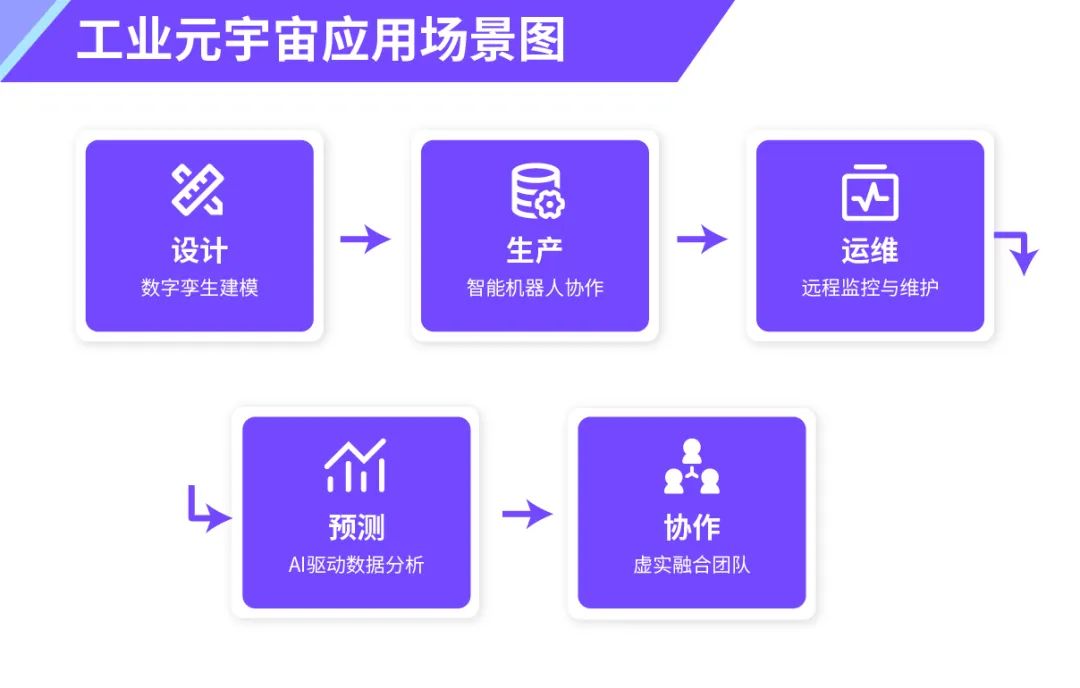
Firstly, the Industrial Metaverse is undergoing a transformation from the superficial to the core. It is no longer a future blueprint confined to PPTs and exhibition halls but has become an engine driving efficiency and innovation in the manufacturing sector.
The Industrial Metaverse essentially involves replicating factories, equipment, processes, and resources from the physical world into virtual space using digital twin technology. It leverages AI's intelligent analysis and autonomous decision-making capabilities to enable real-time simulation and collaboration throughout these processes.
On this cutting-edge productivity platform, generative AI plays a pivotal role. It supports automated modeling, complex process simulation, and intelligent inspection while also fostering unprecedented industrial forms like virtual employees, knowledge management, and expert collaboration.
For instance, Amazon has constructed a highly realistic digital twin of its warehouses using the NVIDIA Omniverse platform, optimizing the layout of robots and human workstations, resulting in extreme efficiency gains in logistics processes. Industry giants like Mercedes-Benz and BMW use virtual factories to test and optimize processes in the Metaverse before investing in real-world production, significantly reducing R&D and operational costs. Nuclear power plants have also transferred safety drills for extreme conditions to digital space, enhancing the scientificity and safety of risk response.
Future factories will first undergo trials and errors in the Metaverse before achieving success in reality. Digital twins + AIoT form the bedrock of the Industrial Metaverse, with every simulation in virtual space contributing to cost reduction and quality improvement in the physical world.
With the continuous evolution of generative AI models, the Industrial Metaverse will continually expand its boundaries. By 2030, it is anticipated to serve as an upgraded version of the Industrial Internet, becoming the primary arena for the global manufacturing industry to pursue efficiency limits and innovative breakthroughs.
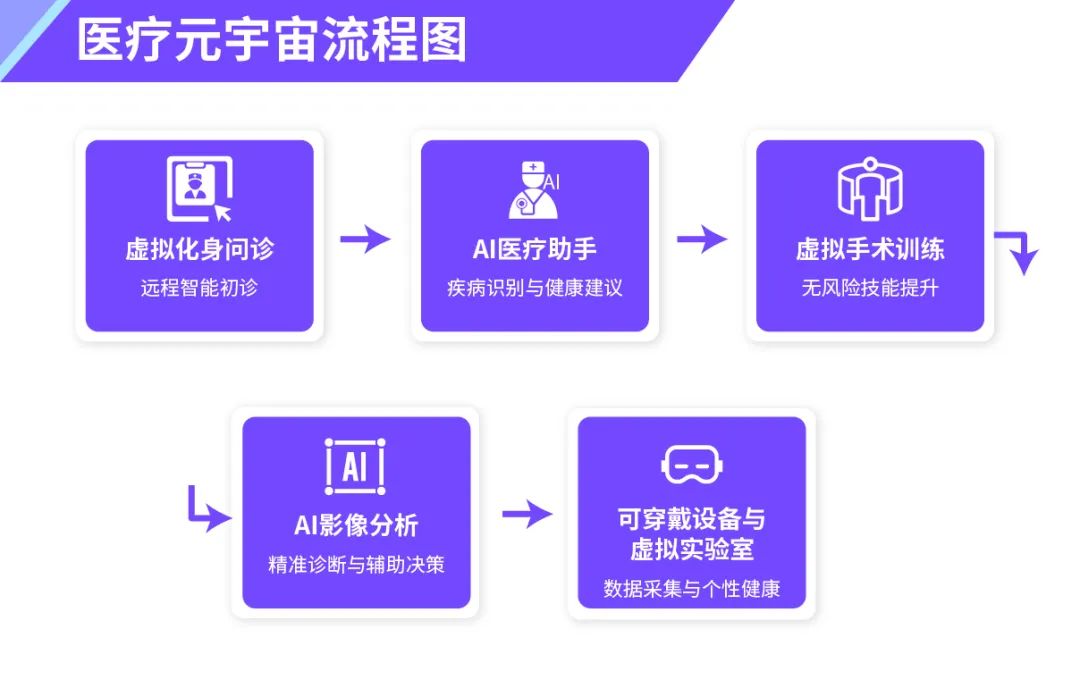
Similarly, the healthcare industry is embracing a new paradigm shift with the deep integration of the Metaverse and generative AI.
The Medical Metaverse shines brightest in breaking the temporal, spatial, and identity boundaries of traditional healthcare. Through virtual avatars and AI medical assistants, patients can access precise and personalized diagnosis, treatment, and health management from anywhere.
When generative AI converges with technologies like virtual reality and augmented reality, core areas such as medical device R&D, surgical training, disease prediction, and medical image analysis become comprehensively intelligent.
Leading global medical device manufacturers have utilized the Metaverse to construct virtual laboratories, leveraging AI to automatically generate diverse clinical scenarios and case data, accelerating the R&D of new devices and drugs. Doctors can repeatedly practice complex surgeries in highly realistic virtual environments, reducing training risks while achieving standardized and large-scale skill enhancements. Additionally, AI-driven wearable devices enable round-the-clock collection of patients' physiological data, with generative AI facilitating intelligent diagnosis, abnormal warnings, and personalized health suggestions, truly driving the transformation of medical services from passive treatment to proactive prevention.
Globally, the Medical Metaverse is redistributing medical resources. Patients in remote areas gain access to the same quality of diagnosis and services as those in major cities, thanks to virtual medical spaces and AI experts. The openness and sharing of medical data have also unprecedentedly advanced medical innovation and health equity.
It is foreseeable that whether it's factories, hospitals, or cities, future industrial innovations will first undergo trials, errors, and evolution in the Metaverse before replicating optimal solutions to the real world. This trend not only redefines the innovation logic of industries but also opens up new avenues for universal healthcare benefits and intelligence.
The AI-driven Industrial Metaverse is not a technological show-off but a shortcut for real-world economic leaps. Industries like manufacturing, healthcare, and urban development are all industrial applications of the Metaverse. The greatest value of the Industrial Metaverse lies in seamlessly collaborating and infinitely amplifying human wisdom and machine intelligence.
Omni-domain Collaboration: Concurrent and Convergent Multi-Metaverse Driven by AI
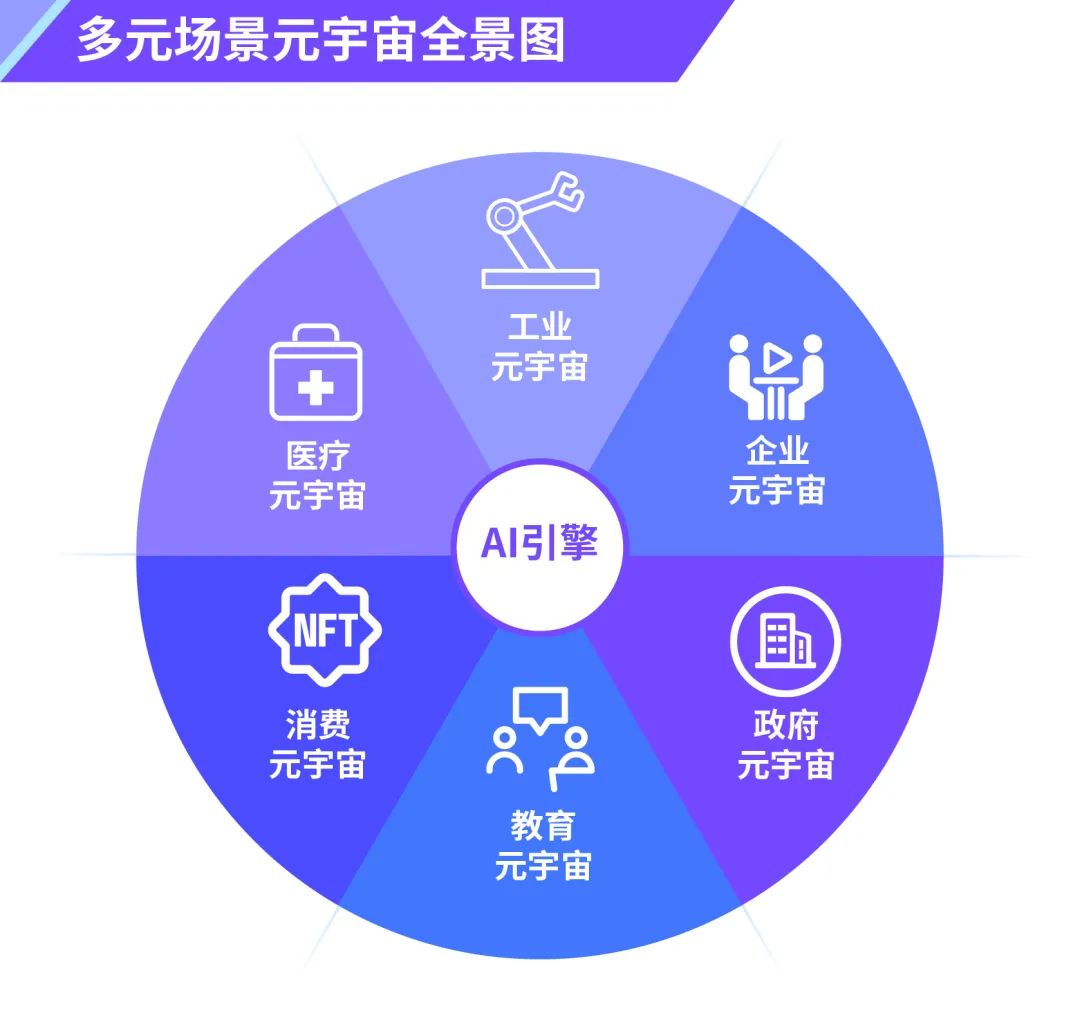
With the continuous evolution of generative AI and agent technology, the Metaverse is no longer confined to a single entertainment or conceptual space. It is gradually demonstrating innovative vitality and transformative power across multiple industry scenarios, including industry, enterprise, consumption, education, buildings, homes, and social governance.
In the Enterprise Metaverse, AI empowers remote collaboration, virtual exhibition halls, employee training, and process optimization. Virtual meetings, intelligent offices, and real-time collaboration among cross-regional teams in digital space enable enterprise operations to transcend physical boundaries. Employee training is no longer limited by traditional textbooks and physical venues, with AI-driven virtual mentors and simulated work scenarios enabling immersive skill transfer and standardized assessment. Virtual exhibition halls and product demonstrations have unveiled new digital business opportunities for enterprises, allowing customers to experience products and interact immersively in the Metaverse, greatly enhancing brand influence and customer loyalty.
The Consumer Metaverse serves more as a testing ground for digital lifestyles. AI-driven virtual social platforms, immersive entertainment experiences, digital asset management, and NFT economies are reshaping brand marketing and user relationships. For example, new interactive experiences like virtual idols, digital collections, and co-branded NFTs have brought the emotional connection between brands and users closer than ever. Users can establish unique digital identities in the virtual world, participate in play-to-earn economic ecosystems, and enjoy highly personalized content recommendations and consumption experiences.
In fields such as education, real estate, and government, the Industrial Metaverse also unleashes enormous potential. Virtual classrooms and immersive training platforms allow students to engage in dialogues with historical figures via AI, restore complex experimental scenarios, and achieve personalized learning tailored to their aptitudes. Real estate enterprises offer buyers a spatial experience far superior to traditional home viewings through virtual property developments and 3D digital model rooms. Urban governance and digital government affairs leverage Metaverse platforms to create digital city halls that integrate virtual and real spaces, enabling citizens to handle business and participate in community co-governance anytime, anywhere. The empowerment of AI makes social governance more intelligent and efficient, driving spatial reconstruction and a comprehensive upgrade of public services.
Whether it's B2B enterprises or B2C users, the diverse scenarios of the Metaverse are profoundly transforming our way of working, living, and social functioning. Therefore, the Industrial Metaverse is not disappearing but is gradually infiltrating enterprises' production lines, supply chains, and innovation chains.
The Industrial Metaverse under the Wave of Intelligence: Opportunities, Risks, and a Decentralized Future
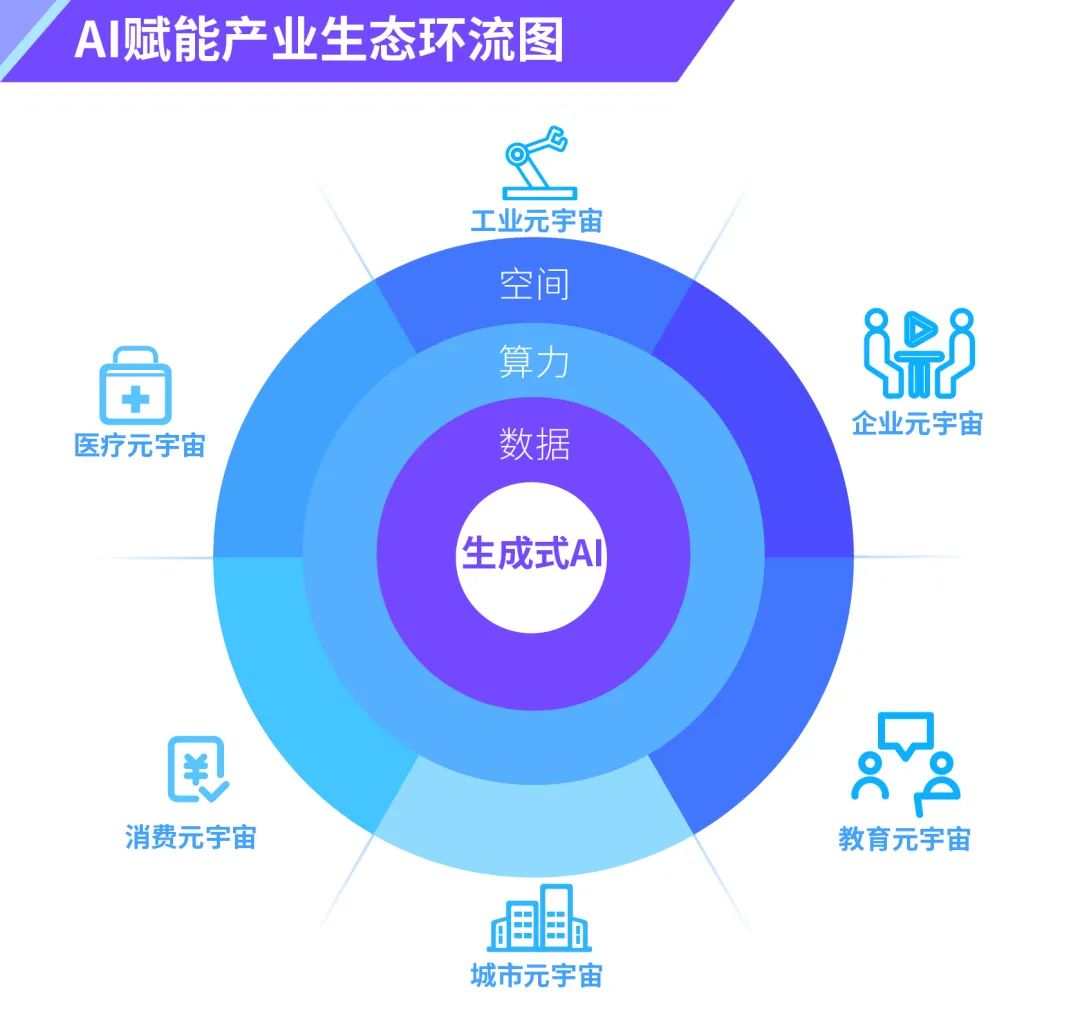
The rise of generative AI has injected fresh fission power into the Industrial Metaverse. It is not only a multiplier of content productivity but also a universal engine across scenarios and industries.
Firstly, generative AI will become a universal engine for various Metaverses, maximizing the multiplier effect of data, computing power, and space.
In areas like enterprise collaboration, consumer entertainment, and smart cities, AI enables virtual-real integration, personalized innovation, and intelligent evolution. With the continuous optimization of AI algorithms and the upgrade of computing power infrastructure, every digital object, virtual space, and interactive process in the Metaverse can achieve unprecedented flexibility and intelligence.
However, every coin has two sides, and technological transitions also bring new risks and challenges. Issues such as data security, privacy protection, AI hallucinations, and algorithmic discrimination are being pushed to the forefront of the industry. Only through the dual drive of technological innovation and regulatory governance can the Metaverse achieve sustainable development.
With sensitive data like personal information, health records, and behavioral patterns flowing widely in the Metaverse, enterprises and governments must establish privacy and security defenses with higher standards to prevent data abuse and security vulnerabilities from triggering trust crises. AI hallucinations and algorithmic biases may introduce deep-seated hazards like misinformation and social injustice, necessitating urgent addressal through algorithmic transparency, data governance, and ethical norms.
In the future, the Industrial Metaverse will also integrate with decentralized technologies like Web3 and blockchain, fostering deep interactions between digital assets, virtual identities, and the real economy. AI + Web3 + blockchain will collectively create a decentralized Industrial Metaverse, realizing the deep integration of digital assets, virtual identities, and the real economy. This not only imparts greater autonomy and transparency to the industrial ecosystem but also reshapes global value chains and business models.
The Industrial Metaverse is not a virtual utopia but a crucible for real productivity evolution. In this industrial upheaval characterized by virtual-real convergence, only by actively embracing the integration of AI, data, and spatial intelligence, and continuously innovating and evolving, can one remain invincible in the future wave.
Written at the End
As the consumer-side Metaverse hype gradually wanes, it has not disappeared but is quietly taking root and deeply growing in the industrial sphere.
In the next decade, AIoT + digital twins will form the foundation of the Industrial Metaverse, propelling key industries like manufacturing, healthcare, and urban development into the second wave of the Industrial Metaverse. From smart factories to virtual hospitals, from digital cities to intelligent supply chains, virtual-real convergence is emerging as the central theme of a new generation of productivity transformations.
It is undeniable that the 'Industrial Metaverse' stands poised to become the next pinnacle of innovation in the global digital economy, where the next generation of industrial titans will rise from the fusion of AI-driven virtual and real worlds. This paradigm shift will usher in qualitative leaps across various sectors, including the digital and intelligent transformation of the manufacturing industry, the universal benefits of intelligent healthcare, and the advanced urban governance through intelligence.
The Metaverse chapter is but a prelude. Far from fading away, the Metaverse will delve deeper into the realm of industry, propelling the global industrial landscape towards a future characterized by unparalleled intelligence, digitalization, and collaboration, all in a more profound and pragmatic manner.

